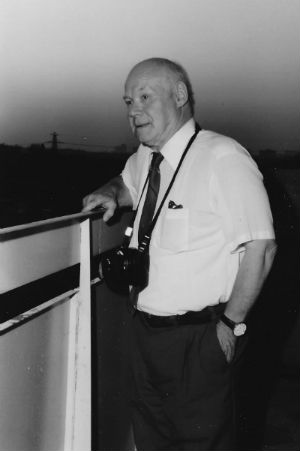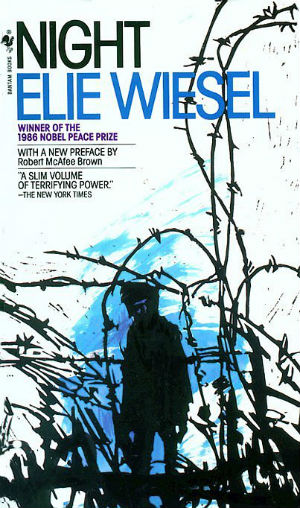Zygmunt Ponzniak – My Most Unforgettable Immigrant
By Neil Earle
 LION AT REST: Mr. Pozniak relaxes on his balcony at his Toronto apartment, 1993. (Photo by Wayne Laviere)
LION AT REST: Mr. Pozniak relaxes on his balcony at his Toronto apartment, 1993. (Photo by Wayne Laviere)“Kto
sie w opieje poda Panu swemu
A,
caly prawie sercem ufa Jemu.”
The words are Polish from the beautiful and inspiring words of Psalm 91:2 which read, “He who dwells in the shelter of the Most High/Will rest in the shadow of the Almighty.”
These words meant a lot to Zygmunt Pozniak, a Polish immigrant to Canada I met while pastoring the Toronto West Worldwide Church of God in the 1980s. When I did this interview he was a rugged 76-year-old with a story to tell that was second to none.
Mr. Pozniak first encountered Psalm 91 when attending the Catholic Church with his parents in the Poznan area of Poland. Psalm 91 is the ultimate “protection psalm” for those who seek God. The great preacher C.H. Spurgeon said of the author: “Ill to him is no ill, but only good in a mysterious form. Losses enrich him, sickness is his medicine, reproach is his honor, death is his gain” (Mother, Psalms 73-150, page 82). Sygmunt’s father, an architect, was a regular reader of the Bible even though such practice was discouraged by successive Russian and Nazi overlords.
Mr. Pozniak often heard Psalm 91 recited in church from the Psaltery Dawidow by Jan Kocharowski. This childhood repetition proved to be a lifesaver for Zygmunt as his life passed through the dangerous corridor of World War Two. His life is like millions of other set against the winds of war that blew across the stormy 20th century.
Winds of War
Mr. Pozniak was born in Symboirsk, Russia on the Volga in 1916. His family moved to Poland in 1918 where young Zygmunt attended technical school. He has vivid memories of his father explaining portions of Scripture to his mother. That, he said, is an experience that stays with a youth for a long, long time. Turning 20 Zygmunt decided to pursue medical training at the University of Poznan, another decision he considers pivotal to saving his life.
 Concentration camp survivors can hold you spellbound. Through his books and life work, the late Elie Wiesel is still testifying.
Concentration camp survivors can hold you spellbound. Through his books and life work, the late Elie Wiesel is still testifying.September 1, 1939 – Hitler’s invasion date for Poland which began the fateful events that changed so many worlds. With Poland soon under Nazi control young Zygmunt was struck how some former friends now lorded it over the people. Collaboration! The Nazis conscripted youth for forced labor and his family escaped the first draft. Then came the fateful knock on the door. It was the S.S., the most fanatical Nazis. Mr. Pozniak and his family (excepting his brother who joined the resistance) were shipped to Nenisko, a village in eastern Poland near Hungary.
They were assigned to a former Jewish residence which still had the mezuzah, a Jewish replica of the Ten Commandments. Impulsively, young Zygmunt pocketed the mezuzah and headed for Hungary! He was soon to learn the eighth commandment against stealing was real – a border guard captured him and arrested him as a Jew.
Here was a dangerous moment but he talked his way clear and ended up with another Polish family who were helping people cross into Hungary. But all of them were reported to the Nazis.
Second Train to Auschwitz
The next few months Mr. Pozniak was shuffled around to various jails. In June 1940 he was shipped on the second transport to Auschwitz concentration camp in Poland. He was assigned as prisoner number 931. It was then under confinement that a combination of shrewd survival skills and the inspiration of Psalm 91 came to his rescue.
Once when a bread truck pulled up into the camp, Zygmunt was pressured by fellow-prisoners to help him steal food. It was then he heard a distinct voice saying “No! Don’t do it!” The other prisoner was soon captured and executed. Mr. Pozniak’s eyes glowed when he recited to me verses 7 and 10 of Psalm 91: “A thousand may fall at your side, ten thousand at your right hand, but it will not come near you…no harm will befall you, no disaster will come near your tent.”
“I had forgotten the Lord’s prayer,” Mr. Pozniak added to me, “but not this one.”
The second incident of what he asserts as God’s overruling Providence came in 1942 when the prisoners were summoned outside in the middle of night. Fearful, anxious and crouching in his bed, Sigmund tried to hide when he heard the clear voice of his father, as if from nowhere. The voice said “Go!” and he did. He found the call was out for healthy workers to transfer to Mautheusen Camp in Austria. He was snatched from Auschwitz, he believes, by the hand of that guiding Providence that had inspired Psalm 91.
Providence indeed for he later learned that all prisoners with numbers below 2000 were exterminated at Auschwitz.
Facing the Machine Guns
At Mauthausen a scene occurred which most of us only read about or see in movies. Zygmunt Poznaik, now a hospital orderly, intervened and forcibly rescued a patient from a brutal beating. There, alongside the barbed wire fence facing the commandant, guard dogs snarling, machine guns pointed, Mr. Pozniak spoke words that he believed sprang from Jesus’ promise in Matthew 10:19, “When they arrest you, do not worry about what to say or how to say it. At that time you will be given what to say.”
Faced with certain death, Zygmunt Pozniak found springing from his mouth the words, “I was only following Hitler’s orders.”
Surprised, the commandant replied: “What do you mean?”
“Hitler said that doctors must save lives not take them.”
You could cut the tension with a knife.
As his life literally hung by a thread, young Zygmunt Pozniak was relieved to see the commandant wave his hand and motion him back to the compound.
That night his emotional mood was perhaps best captured by his friend, the unknown author of Psalm 91: “I will say of the Lord, He is my refuge and my fortress, my God in whom I will trust. Surely he will save you form the fowler’s snare and from the deadly pestilence. He will cover you with his feathers, under his wings you will find refuge” (Psalm 91:3-4).
A Study in Trust
There were many other times that Mr. Pozniak felt God’s guiding hand on his life, especially through the unsettled postwar years in Italy and England when millions and millions of DP’s (Displaced Persons) were looking for some measure of security.
Mr. Pozniak emigrated to Canada in 1951, married and fathered two daughters he could visit and enjoy in Southern Ontario. He made a lively addition to his Toronto congregation after his baptism in 1987, especially among the young. He was an enthusiastic member of the senior’s group and his hobbies in photography, music and wood work were on display for the many people he invited to his apartment.
After such a life Zygmunt Pozniak made an interesting case study in tranquility and peace of mind. He exemplified the triumph and resilience of the human spirit when directly by its Creator. “You have to trust,” he told me as he wound up the interview. “Whenever I was afraid I would repeat Psalm 91. The whole hymn is about trust to God.” That it is and now we know how it worked in the camps. It can work for you too.